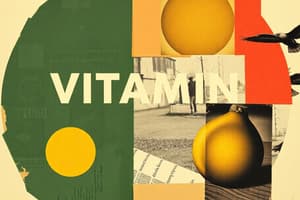Podcast
Questions and Answers
Which vitamin is known to help maintain healthy skin and aids in growth and development?
Which vitamin is known to help maintain healthy skin and aids in growth and development?
What is the function of Vitamin D in the body?
What is the function of Vitamin D in the body?
Which vitamin is particularly noted for its instability in alkaline conditions?
Which vitamin is particularly noted for its instability in alkaline conditions?
What deficiency is associated with increased risk of rickets and osteoporosis?
What deficiency is associated with increased risk of rickets and osteoporosis?
Signup and view all the answers
Which of the following is a common source of Vitamin K?
Which of the following is a common source of Vitamin K?
Signup and view all the answers
What condition is associated with a deficiency in Vitamin A?
What condition is associated with a deficiency in Vitamin A?
Signup and view all the answers
Which vitamin is fat soluble and can be absorbed from sunlight?
Which vitamin is fat soluble and can be absorbed from sunlight?
Signup and view all the answers
What is a key property of Beta Carotene?
What is a key property of Beta Carotene?
Signup and view all the answers
Flashcards
Vitamin A properties
Vitamin A properties
Vitamin A is stable, fat-soluble, and insoluble in water. It dissolves in acetone.
Vitamin A functions
Vitamin A functions
Vitamin A maintains healthy skin, aids growth, and acts as an antioxidant.
Vitamin A deficiency
Vitamin A deficiency
Vitamin A deficiency can lead to night blindness, dry skin, and delayed growth.
Vitamin A sources
Vitamin A sources
Signup and view all the flashcards
Vitamin E properties
Vitamin E properties
Signup and view all the flashcards
Vitamin E functions
Vitamin E functions
Signup and view all the flashcards
Vitamin K functions
Vitamin K functions
Signup and view all the flashcards
Vitamin D properties
Vitamin D properties
Signup and view all the flashcards
Study Notes
Soluble Vitamins
-
Vitamin A (Retinol):
- Yellow colour
- Soluble in fats
- Insoluble in water
- Dissolves in acetone
- Functions: maintains healthy skin; supports growth and development; acts as an antioxidant
- Deficiencies: night blindness; follicular hyperkeratosis; delayed growth in children; risk of damage to cells
- Sources: retinol-rich animal products (e.g., milk, cheese, oily fish, butter, margarine)
-
Beta Carotene:
- Soluble in alcohol
- Relatively stable
- Unaffected by acids
- Antioxidant
- Functions: helps maintain healthy skin; supports growth and development; acts as an antioxidant
- Sources: carrots, sweet potatoes, red peppers, apricots, and tomatoes
-
Vitamin D:
- Most stable vitamin
- Fat-soluble/insoluble in water
- Heat-stable
- Unaffected by acids
- Functions: absorption of calcium and phosphorus in blood; contributes to strong bones
- Deficiencies: increased risk of bone disease (e.g., rickets in children, osteoporosis in adults); risk of tooth decay
- Sources: fortified milk, eggs, butter, margarine, oily fish
-
Vitamin E (K1/K2/K3):
- Fat-soluble
- Insoluble in water
- Heat-stable, but destroyed by heating
- Functions: aids in blood clotting; protects red blood cells; helps with wound healing; important for nerve functions,etc.
- Deficiencies: slow blood clotting of ruptured blood vessels; lead to haemorrhages
- Sources: nuts, eggs, leafy green vegetables, wheat germ seeds, oils
-
Vitamin K (K1/K2/K3):
- Fat-soluble
- Insoluble in water
- Heat stable
- Destroyed by harsh heating conditions
- Function: aids in blood clotting
- Deficiencies: slow blood clotting, problems with ruptured blood vessels; can lead to hemorrhages.
- Sources: many food sources
RDA/RI
-
Vitamin A:
- Children: 400-500 µg
- Adults: 600-700 µg
- Pregnant women: 700 µg
- Breastfeeding women: 950 µg
-
Vitamin D:
- Children: 10 µg
- Adults: 10 µg
- Pregnant women: 15 µg
Studying That Suits You
Use AI to generate personalized quizzes and flashcards to suit your learning preferences.
Related Documents
Description
This quiz explores the characteristics, functions, and sources of soluble vitamins such as A, D, and beta carotene. Understand their roles in maintaining health and the consequences of deficiencies. Test your knowledge on the various aspects of these vital nutrients.




